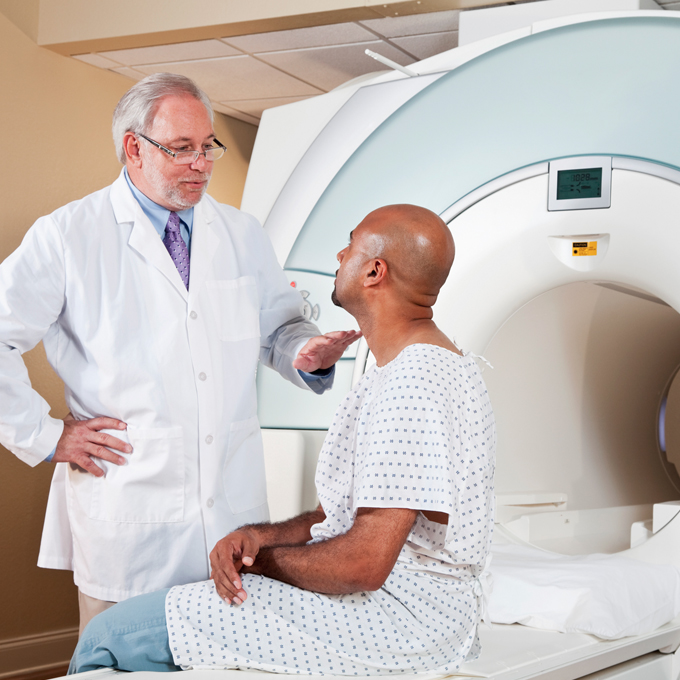Providing your location allows us to show you nearby locations and doctors.
MRI Scans

Magnetic resonance imaging (MRI) scans use a powerful magnetic field and radio waves to provide detailed, computerized images of organs and tissues to have a clear look at patient’s internal anatomy.
This revolutionary technology does not use X-rays or radiation. MRI uses a magnetic field and radio waves to provide computerized images, which appear as "slices" of the anatomy, that radiologists* use to determine the differences between healthy and abnormal tissue.
MRI exams may be performed to provide information about internal tissue that cannot be viewed through X-rays. With MRI, the smallest structures of the body can be imaged.
Some patients, but not all, will need an injection of contrast as part of the MRI exam. When a radiologist along with your physician decides that contrast is necessary, a pharmaceutical agent, called Gadolinium is administered. The Gadolinium contrast is used to make specific organs, blood vessels, or tissues stand out, helping highlight the structures to better assess for disease or injury. This contrast is not radioactive, is extremely safe and has minimal chances of side effects or adverse reactions.
FAQs
What can I expect during an MRI exam?
An MRI technologist will explain the MRI procedure to you when you arrive but may include the following steps:
You will be asked to remove and store any objects containing metal so that there is no interference with the magnet.
Depending on the part of the body to be scanned, you may be asked to change into a gown.
You will be asked to lie flat on a padded table. If contrast is needed, a small needle is inserted into a vein in the arm or hand, and removed immediately after the injection. As with any medication, there is a slight chance of an allergy, however side effects are very uncommon with Gadolinium. During your exam you will hear a loud knocking noise. This is normal and it is created when some parts of the magnet are turned on and off to measure the MRI signal that comes from the patient’s body. The knocking is loud enough to require ear plugs, which will be provided by the technologist. Only the portion of the body that is being imaged will be at the center of the machine. For example if the head is being imaged, it will be in the center of the magnet. If the knees are being imaged, they will be at the center.
You may talk to the MRI technologist, via an intercom, at any time during the study. However it is best to talk in between the pictures to minimize any motion.
How long will my MRI exam take?
Nuvance Health offers a wide array of examinations. Depending on the type of exam you receive, the length of the procedure will typically be between 30 to 60 minutes. The MRI tech will discuss the specifics of your exam, prior to your test.
Is MRI safe?
MRI does not use X-ray or radiation but does use a strong magnetic field to attain pictures. This strong magnetic field can pull on metallic objects. Therefore, for safety reasons, the MRI staff must determine if you have metal in your body. Some patients may have small pieces of metal in their eyes, metallic implants, prosthetic devices that contain metal, surgical clips, or other implanted devices that could be sensitive to the magnetic field.
Patients with the following conditions are not candidates for MRI:
Patients with any electrical devices in their bodies including cardiac pacemakers or cardiac defibrillators.
Patients with cerebral aneurysm clips are sometimes excluded.
Pregnancy may require postponing non-essential examinations
Who interprets the results of my MRI and how do I get them?
A board certified radiologist* with expertise in supervising and interpreting MRI examinations will analyze the images and send an official report to your primary care physician or the specialist who referred you for the exam. Once they have reviewed the report and the radiologists opinions, they will discuss the results with you.
*In the spirit of keeping you well-informed, the physician(s)/individual(s) identified are neither agents nor employees of Nuvance Health or any of its affiliate organizations. These clinicians render services to Nuvance Health patients under an agreement with Nuvance Health. These clinicians retain independent medical judgment for all services rendered.